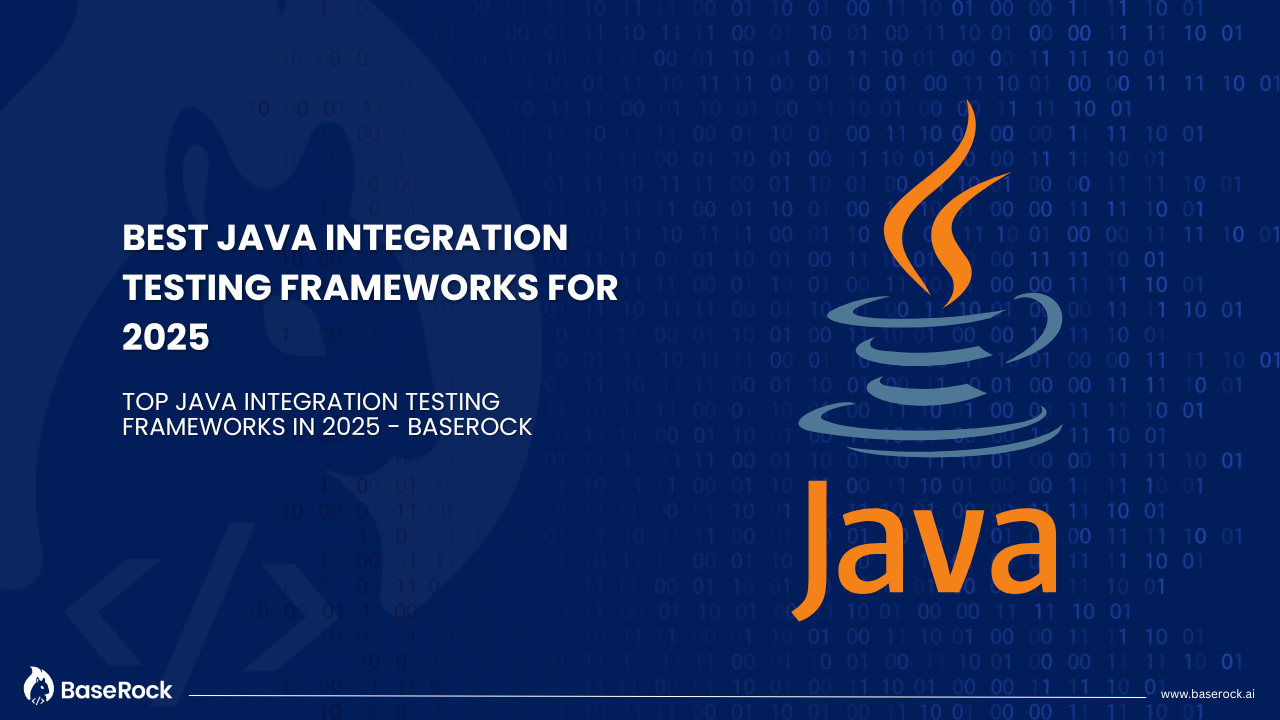.png)

In today’s era of microservices, containerization, and distributed systems, Java integration testing frameworks are more critical than ever. They ensure that different components—APIs, databases, services—interact as expected, catching issues early in complex systems.
BaseRock brings a revolutionary approach to integration testing by combining AI-powered testing workflows with seamless compatibility across Java-based integration testing tools. Whether you're working on Spring Boot services, REST APIs, or Kafka pipelines, BaseRock empowers developers with self-optimizing, auto-generated tests that scale with your codebase.
By integrating with popular frameworks like JUnit 5, TestNG, Spring Test, TestContainers, and RestAssured, BaseRock ensures test reliability and productivity in continuous delivery environments.
Java integration testing focuses on verifying interactions between different parts of a Java application. It goes beyond unit testing by evaluating how modules work together, often in environments that resemble production setups.
While unit testing validates isolated classes or functions, integration tests assess:
These tests bridge the gap between unit and end-to-end testing. They catch misconfigurations, communication failures, and unexpected runtime behavior early—before it reaches staging or production.
When choosing a Java-based integration testing framework, ensure it supports these modern features that align with BaseRock’s capabilities:
Here’s a breakdown of the best Java integration testing frameworks in 2025 and how BaseRock enhances them:
Still the industry backbone for Java testing, JUnit 5 brings extensibility, cleaner annotations, and modular architecture. When paired with TestContainers, it’s perfect for robust integration testing setups.
BaseRock Advantage: Auto-generates JUnit-compatible tests and enhances orchestration within your CI pipelines.
Known for its flexibility, TestNG handles unit, integration, and functional tests using annotations, dependencies, and parallel execution.
BaseRock Advantage: Integrates seamlessly with TestNG for parallel test generation and flakiness reduction.
These tools simulate realistic Spring environments with transaction management, mock MVCs, and embedded databases.
BaseRock Advantage: Generates integration tests that simulate real Spring contexts, complete with mocked beans and services.
A must-have for microservices. It dynamically creates Dockerized databases, message brokers, or Elasticsearch nodes for full-stack testing.
BaseRock Advantage: Orchestrates container spin-ups automatically and tears them down after tests, reducing manual setup.
For service-level integration, Mockito mocks dependencies to isolate interactions between classes without affecting external services.
BaseRock Advantage: Recognizes mocked services and focuses test generation around real integration points.
BaseRock Advantage: Parses BDD scenarios to auto-generate step implementations and integrate validation checkpoints.
BaseRock Advantage: Reads existing RestAssured or Karate tests and recommends coverage gaps or missing flows..
BaseRock acts as an Agentic QA engine, designed to augment your integrations:

Regardless of your stack, BaseRock simplifies framework orchestration and boosts test quality with minimal overhead.
Java’s ecosystem is vast—and so are the integration testing tools it offers. Choosing the right combination can be overwhelming. That’s where BaseRock steps in.
By acting as an Agentic QA platform, BaseRock:
BaseRock turns your testing strategy from reactive to proactive—improving release velocity, stability, and developer experience.
<button>Start Your Free BaseRock Trial →</button>
Q1: What’s the difference between unit and integration testing in Java?
Unit tests isolate individual components with mocks; integration tests evaluate how those components interact with actual services or systems.
Q2: Can I use multiple testing frameworks together?
Absolutely. Many teams combine JUnit or TestNG with Mockito, TestContainers, Cucumber, or Spock based on the test scope.
Q3: Are TestContainers suitable for microservices in BaseRock?
Yes—TestContainers can orchestrate dependencies like databases or message brokers, enabling full-stack integration tests.
Q4: How does BaseRock help in Java integration testing?
BaseRock auto-generates tests, manages containers, integrates into CI/CD, analyzes coverage, and optimises execution.
Ready to Optimize Java Integration Testing?
Flexible deployment - Self hosted or on BaseRock Cloud